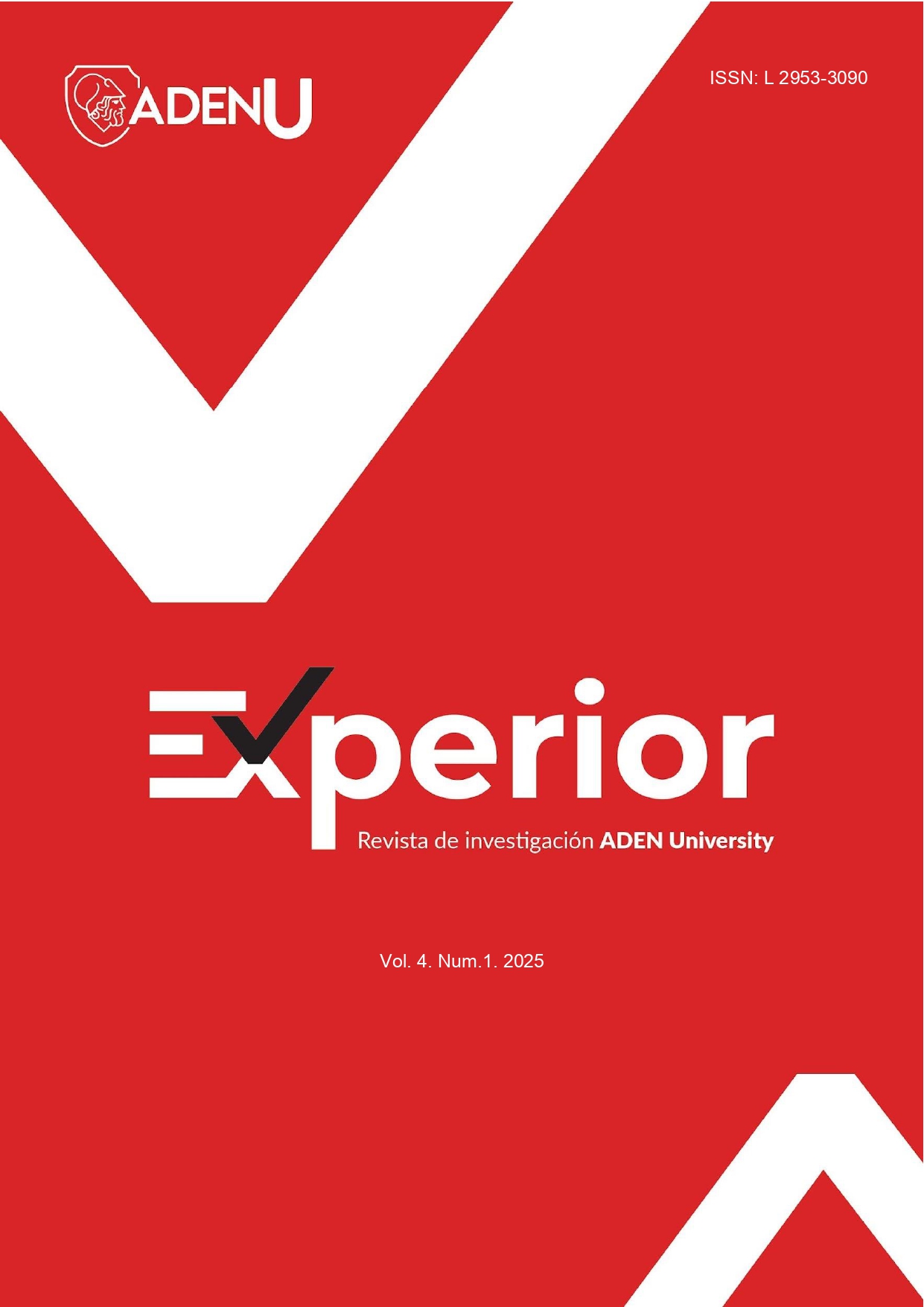Competencias metacognitivas del docente en la enseñanza del español
DOI:
https://doi.org/10.56880/experior41.2Palabras clave:
competencias del docente, demostración pedagógica, español-proceso de aprendizaje, gestión de la educación, método de enseñanzaResumen
El propósito de este estudio describe las competencias metacognitivas que los docentes aplican en la enseñanza del español en contextos universitarios. Se utilizó un diseño documental cualitativo, descriptivo y transversal, basado en el análisis de artículos, revisiones sistemáticas y trabajos empíricos, mediante una codificación temática que seleccionó fuentes académicas relevantes publicadas entre los años 2012 y 2022, analizadas siguiendo los criterios cualitativos establecidos por Grossehme, y Taylor & Bogdan, para interpretar información en contextos específicos. El resultado principal demostró que la implementación de las competencias metacognitivas en los procesos educativos tiene un impacto positivo en la comprensión y el rendimiento académico a largo plazo. La principal conclusión demostró que la integración de las competencias metacognitivas mejora la comprensión y el rendimiento de los estudiantes a largo plazo y su capacidad de aprendizaje autónomo, recomendándose la implementación de programas de formación docente que incluyan módulos dedicados al conocimiento y aplicación de las estrategias metacognitivas, enfocándose en fortalecer el conocimiento general y el metaconocimiento estratégico, particularmente en relación con el aprendizaje de orden superior.
Descargas
Referencias
Ahmed, J. U. (2010). Documentary research method: New dimensions. Indus Journal of Management & Social Sciences, 4(1), 1-14. https://acortar.link/EQPqfK
Kim, H., Sefcik, J. S., & Bradway, C. (2017). Characteristics of qualitative descriptive studies: A systematic review. Research in nursing & health, 40(1), 23-42. https://doi.org/10.1002/nur.21768
Onwuegbuzie, A. J., Leech, N. L., & Collins, K. M. (2012). Qualitative analysis techniques for the review of the literature. Qualitative Report, 17, 56. https://files.eric.ed.gov/fulltext/EJ981457.pdf
Amin, A. M., Corebima, A. D., Zubaidah, S., & Mahanal, S. (2020). The Correlation between Metacognitive Skills and Critical Thinking Skills at the Implementation of Four Different Learning Strategies in Animal Physiology Lectures. European Journal of Educational Research, 9(1), 143-163. https://files.eric.ed.gov/fulltext/EJ1241218.pdf
Ausubel, D. P. (1977). The facilitation of meaningful verbal learning in the classroom. Educational psychologist, 12(2), 162-178. https://psycnet.apa.org/doi/10.1080/00461527709529171
Avargil, S., Lavi, R., & Dori, Y. J. (2018). Students’ metacognition and metacognitive strategies in science education. Cognition, metacognition, and culture in STEM education: Learning, teaching and assessment, 33-64. https://doi.org/10.1007/978-3-319-66659-4_3
Ben-David, A., & Orion, N. (2013). Teachers’ voices on integrating metacognition into science education. International Journal of Science Education, 35(18), 3161-3193. https://doi.org/10.1080/09500693.2012.697208
Bruckermann, T., Aschermann, E., Bresges, A., & Schlüter, K. (2017). Metacognitive and multimedia support of experiments in inquiry learning for science teacher preparation. International Journal of Science Education, 39(6), 701-722. https://doi.org/10.1080/09500693.2017.1301691
Caena, F., & Redecker, C. (2019). Aligning teacher competence frameworks to 21st century challenges: The case for the European Digital Competence Framework for Educators (Digcompedu). European journal of education, 54(3), 356-369. https://doi.org/10.1111/ejed.12345
Conley, D. T. (2014). Learning Strategies as Metacognitive Factors: A Critical Review. Educational Policy Improvement Center. https://files.eric.ed.gov/fulltext/ED593387.pdf
De Boer, H., Donker, A. S., Kostons, D. D., & Van der Werf, G. P. (2018). Long-term effects of metacognitive strategy instruction on student academic performance: A meta-analysis. Educational Research Review, 24, 98-115. https://doi.org/10.1016/j.edurev.2018.03.002
De la Fuente, J., Sander, P., Martínez-Vicente, J. M., Vera, M., Garzón, A., & Fadda, S. (2017). Combined effect of levels in personal self-regulation and regulatory teaching on meta-cognitive, on meta-motivational, and on academic achievement variables in undergraduate students. Frontiers in Psychology, 8, 232. https://doi.org/10.3389/fpsyg.2017.00232
Dignath-van Ewijk, C., & Van der Werf, G. (2012). What teachers think about self‐regulated learning: Investigating teacher beliefs and teacher behavior of enhancing students’ self‐regulation. Education Research International, 2012(1), 741713. https://doi.org/10.1155/2012/741713
Dunn, K. E., Rakes, G. C., & Rakes, T. A. (2014). Influence of academic self-regulation, critical thinking, and age on online graduate students’ academic help-seeking. Distance Education, 35(1), 75-89. https://doi.org/10.1080/01587919.2014.891426
Ellis, A. K., Denton, D. W., & Bond, J. B. (2014). An analysis of research on metacognitive teaching strategies. Procedia-Social and Behavioral Sciences, 116, 4015-4024. https://doi.org/10.1016/j.sbspro.2014.01.883
Fathima, M. P., Sasikumar, N., & Roja, M. P. (2014). Enhancing teaching competency of graduate teacher trainees through metacognitive intervention strategies. American Journal of Applied Psychology, 2(1), 27-32. https://doi.org/10.12691/ajap-2-1-5
Flavell, J. H. (1979). Metacognition and cognitive monitoring: A new area of cognitive–developmental inquiry. American Psychologist, 34(10), 906–911. https://doi.org/10.1037/0003-066x.34.10.906
Ghanizadeh, A. (2017). The interplay between reflective thinking, critical thinking, self-monitoring, and academic achievement in higher education. Higher Education, 74, 101-114. https://doi.org/10.1007/s10734-016-0031-y
González, A., Fernández, M. V. C., & Paoloni, P. V. (2017). Hope and anxiety in physics class: Exploring their motivational antecedents and influence on metacognition and performance. Journal of Research in Science Teaching, 54(5), 558-585. https://doi.org/10.1002/tea.21377
Gopinath, S. (2014). Metacognitive awareness in teaching and teaching competency: A survey on student teachers at secondary level. Science, 250(128.27), 26-89. https://acortar.link/4sQAXT
Grossoehme, D. H. (2014). Overview of qualitative research. Journal of health care chaplaincy, 20(3), 109-122. https://doi.org/10.1080/08854726.2014.925660
Gurcay, D., & Ferah, H. O. (2018). High School Students' Critical Thinking Related to Their Metacognitive Self-Regulation and Physics Self-Efficacy Beliefs. Journal of Education and training Studies, 6(4), 125-130. https://files.eric.ed.gov/fulltext/EJ1174338.pdf
Hamzah, H., Hamzah, M. I., & Zulkifli, H. (2022). Systematic literature review on the elements of metacognition-based higher order thinking skills (HOTS) teaching and learning modules. Sustainability, 14(2), 813. https://doi.org/10.3390/su14020813
Jiang, Y., Ma, L., & Gao, L. (2016). Assessing teachers' metacognition in teaching: The teacher metacognition inventory. Teaching and Teacher Education, 59, 403-413. https://doi.org/10.1016/j.tate.2016.07.014
Jiménez, R. T. (1994). The metacognitive strategies of Latina/o students who read Spanish and English. Center for the Study of Reading Technical Report.
Khezrlou, S. (2012). The relationship between cognitive and metacognitive strategies, age, and level of education. The Reading Matrix, 12(1). https://www.readingmatrix.com/articles/april_2012/khezrlou.pdf
Martínez-Fernández, J. R., & Vermunt, J. D. (2015). A cross-cultural analysis of the patterns of learning and academic performance of Spanish and Latin-American undergraduates. Studies in Higher Education, 40(2), 278-295. https://doi.org/10.1080/03075079.2013.823934
Medina, M. S., Castleberry, A. N., & Persky, A. M. (2017). Strategies for improving learner metacognition in health professional education. American journal of pharmaceutical education, 81(4), 78. https://doi.org/10.5688/ajpe81478
Olivier, M. (2018). Planificación educativa, dimensiones y componentes. Limbhart Editores.
Ozturk, N. (2017). An analysis of teachers’ self-reported competencies for teaching metacognition. Educational Studies, 43(3), 247-264. https://doi.org/10.1080/03055698.2016.1273761
Perry, J., Lundie, D., & Golder, G. (2019). Metacognition in schools: what does the literature suggest about the effectiveness of teaching metacognition in schools?. Educational Review, 71(4), 483-500. https://doi.org/10.1080/00131911.2018.1441127
Petersen, C. I., Baepler, P., Beitz, A., Ching, P., Gorman, K. S., Neudauer, C. L., ... & Wingert, D. (2020). The tyranny of content:“Content coverage” as a barrier to evidence-based teaching approaches and ways to overcome it. CBE—Life Sciences Education, 19(2), ar17. https://doi.org/10.1187/cbe.19-04-0079
Rastegar, M., Kermani, E. M., & Khabir, M. (2017). The relationship between metacognitive reading strategies use and reading comprehension achievement of EFL learners. Open Journal of Modern Linguistics, 7(2), 65-74. https://doi.org/10.4236/ojml.2017.72006
Rivers, M. L. (2021). Metacognition about practice testing: A review of learners’ beliefs, monitoring, and control of test-enhanced learning. Educational Psychology Review, 33(3), 823-862. https://doi.org/10.1007/s10648-020-09578-2
Smith, A. K., Black, S., & Hooper, L. M. (2020). Metacognitive knowledge, skills, and awareness: A possible solution to enhancing academic achievement in African American adolescents. Urban Education, 55(4), 625-639. https://doi.org/10.1177/0042085917714511
Soodla, P., Jõgi, A. L., & Kikas, E. (2017). Relationships between teachers’ metacognitive knowledge and students’ metacognitive knowledge and reading achievement. European Journal of Psychology of Education, 32, 201-218. https://doi.org/10.1007/s10212-016-0293-x
Soto, C., Gutiérrez de Blume, A. P., Jacovina, M., McNamara, D., Benson, N., & Riffo, B. (2019). Reading comprehension and metacognition: The importance of inferential skills. Cogent Education, 6(1), 1565067. https://doi.org/10.1080/2331186X.2019.1565067
Stanton, J. D., Sebesta, A. J., & Dunlosky, J. (2021). Fostering metacognition to support student learning and performance. CBE—Life Sciences Education, 20(2), fe3. https://doi.org/10.1187/cbe.20-12-0289
Taylor, S. J., & Bogdan, R. (1987). Introducción a los métodos cualitativos de investigación. Paidós.
Thompson, D. R. (2012). Promoting metacognitive skills in intermediate Spanish: Report of a classroom research project. Foreign language annals, 45(3), 447-462. https://doi.org/10.1111/j.1944-9720.2012.01199.x
Toma, R. B., & Greca, I. M. (2018). The effect of integrative STEM instruction on elementary students’ attitudes toward science. Eurasia Journal of Mathematics, Science and Technology Education, 14(4), 1383-1395. https://doi.org/10.1080/0907676X.2019.1566390
Uzuntiryaki-Kondakci, E., & Capa-Aydin, Y. (2013). Predicting critical thinking skills of university students through metacognitive self-regulation skills and chemistry self-efficacy. Educational Sciences: Theory and Practice, 13(1), 666-670. https://files.eric.ed.gov/fulltext/EJ1016667.pdf
Veas, A., Castejón, J. L., Miñano, P., & Gilar‐Corbí, R. (2019). Relationship between parent involvement and academic achievement through metacognitive strategies: A multiple multilevel mediation analysis. British journal of educational psychology, 89(2), 393-411. https://doi.org/10.1111/bjep.12245
Zohar, A., & Barzilai, S. (2013). A review of research on metacognition in science education: Current and future directions. Studies in Science education, 49(2), 121-169. https://doi.org/10.1080/03057267.2013.847261
Zohar, A., & Lustov, E. (2018). Challenges in addressing metacognition in professional development programs in the context of instruction of higher-order thinking. Contemporary pedagogies in teacher education and development, 87-100. https://doi.org/10.5772/intechopen.76592
Descargas
Publicado
Número
Sección
Licencia
Derechos de autor 2025 Betsy Dagmara Urriola-Adams (Autor/a)

Esta obra está bajo una licencia internacional Creative Commons Atribución-NoComercial 4.0.










